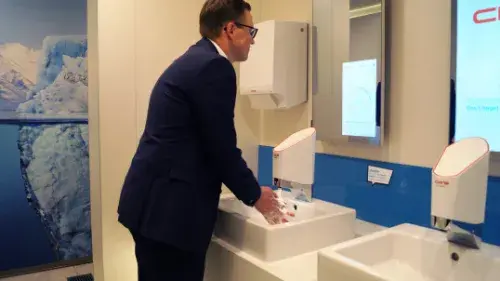Dreieich, 08.03.2019.
Washing hands makes successful. When employees are absent due to illness during waves of colds after business trips, trade fairs and major events, the workload is high for every company: shifts and tasks have to be rescheduled, orders remain unprocessed, productivity drops and some companies even have to close for days on end. The loss of turnover is immense. Increasing mobility around the globe also poses a health risk. The solution: Companies and businesses are focusing more on health prevention of their employees and training them. Disciplined hand hygiene is becoming increasingly easier for users of washrooms. Digitized products and processes in a "washroom of the future" serve as aids for more hygiene and health - in the company and around the world.
Every third employee who had been absent in February 2018 stayed at home because of a flu-like infection. Diseases cost German companies around 130 billion euros per year. This translates into around 3,600 euros per capita.1 Regular hand washing and drying efficiently prevents the risk of infection. A study from the USA shows that hand hygiene in combination with appropriate training can reduce the sick rate by up to 50.6 percent.2
Thomas Schmidt, CEO of CWS-boco International GmbH, orients his entire company towards providing more health and safety: "As a modern system provider, we focus on more than just products. A newly established business unit is responsible for integrated washroom solutions. Research and development at CWS-boco follow the vision to make the world healthier and safer through innovative and digital solutions".
Airport risk: health prevention in times of increasing mobility
Around four billion people were travelling at international airports in 2017. In 2038, the International Air Transport Association estimates that this figure will rise to around 7.8 billion. The traffic hubs do not only distribute people all over the world. Pathogens are unwanted travel companions here. Washing hands at airports has a direct effect on the spread of germs. This is shown by a recent simulation by international scientists3: an increase in the level of hand hygiene at the turnstiles significantly reduces the worldwide spread of infectious diseases.
Online recommendations: Hygiene as a quality feature and competitive advantage
Today's society deals very systematically with decisions. She doesn't want to be unpleasantly surprised while travelling or in the washroom. So, she relies on online recommendations. Apps and criticisms from the community are also becoming increasingly important for the operators of washrooms. A public washroom is a sensitive, intimate area that has to meet a variety of requirements. Families want equipment suitable for children, people with walking disabilities or older citizens may be looking for toilets that are higher up. This information and the hygiene level provide information on whether a location is visited or not. The catering trade can also enhance its image with top-equipped washrooms.
The digitization of equipment as a driver for more hygiene
On average, people spend three years of their lives in washrooms. Therefore, a washroom should offer a hygienic experience. CWS-boco would like to realize a holistic concept in the washroom, for which washroom trends and the wishes of the users are investigated. The company’s site in Duisburg has its own washroom of the future, the CWS Washroom Experience Lab. This test laboratory shows how pleasant public washrooms can already be today: Before entering the washroom, CWS-boco guides the visitor by indicating which cabin is free and freshly cleaned. In this way, the user already has the first positive experience when entering the washroom.
Mirror, mirror on the wall shows the correct hand hygiene
Doors without handles that can be opened without contact; walls with an antibacterial surface and a module in the mirror that indicates how long the hands should be soaped, rinsed and dried. A digital faucet dispenses water and soap ready mixed. These technologies promote better hand hygiene by integrating a training component and the automatic use of soap into the hand washing process. According to a study by the London School of Hygiene & Tropical Medicine, only 32 percent of men wash their hands with soap. The figure for women is 64 percent.
Washing hands remains an essential means of disease prevention and for the benefit of all: in the workplace, in the company and in public spaces. CWS-boco has the mission to contribute to more health and safety with its holistic concepts.
1 Booz & Company strategy consulting firm
2 Study: The effect of a comprehensive handwashing program on absenteeism in elementary schools
Reference: AJIC: American Journal of Infection Control. 30(4):217-220, June 2002. Guinan, Maryellen a,b; McGuckin, Maryanne Dr ScEd, MT (ASCP) c; Ali, Yusef PhD
3 https://www.biorxiv.org/content/10.1101/530618v1c
About CWS-boco
CWS-boco is one of the leading international service providers of professional textile services and washroom hygiene solutions. The solution portfolio includes the CWS hand towel, soap and fragrance dispensers, dust control mats as well as workwear and protective clothing of boco. The company understands itself as innovations and quality leader in Europe.
CWS-boco employs some 10,800 employees in 16 countries and generated a turnover of 971 million Euro in 2017. Franz Haniel & Cie. GmbH holds an 82% share and Rentokil Initial plc an 18% share of CWS-boco.
Laura Plischke
CWS International GmbH
Dreieich Plaza 1A
63303
Dreieich
Germany
Madeleine Pilpin
Senior PR-Beraterin
vibrio. Kommunikationsmanagement Dr. Kausch GmbH
D-80333
München
Germany


